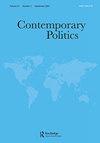Brazilian climate policy (1992–2019): an exercise in strategic diplomatic failure
IF 2
3区 社会学
Q1 POLITICAL SCIENCE
引用次数: 7
Abstract
ABSTRACT In the Anthropocene, practicing diplomacy with a renewed emphasis on strategy is critical. However, the implications of the planet’s new geological reality – of which climate change is the primary indicator – have not been internalised into policy and practice thus far at both the domestic and international levels. Brazil is no exception. In this article, the strategic diplomacy framework is applied to the Brazilian case as a policy proposal and diagnostic tool to (a) identify the country’s strategic climate interest, (b) propose a diplomatic strategy capable of addressing the gravity of the climate crisis, and (c) analyse the factors blocking the development of a national agenda and policy consistent with a climate security scenario. Despite Brazil’s vast natural capital, powerful interests in the agribusiness and energy sectors, lack of vision among the ruling elites, and a poorly educated population in a society still marked by high levels of poverty and income inequality have precluded the country from developing a leading role in the global climate arena.巴西气候政策(1992-2019):战略外交失败中的演习
摘要在人类世,重新强调战略的外交实践至关重要。然而,迄今为止,气候变化是地球新地质现实的主要指标,其影响尚未内化为国内和国际层面的政策和实践。巴西也不例外。在本文中,战略外交框架被应用于巴西的案例,作为一种政策建议和诊断工具,以(a)确定该国的战略气候利益,(b)提出能够应对气候危机严重性的外交战略,以及(c)分析阻碍制定符合气候安全设想的国家议程和政策的因素。尽管巴西拥有庞大的自然资本,在农业综合企业和能源部门拥有强大的利益,统治精英缺乏远见,在一个仍然以高度贫困和收入不平等为特征的社会中,人口受教育程度低,这些都使该国无法在全球气候舞台上发挥领导作用。
本文章由计算机程序翻译,如有差异,请以英文原文为准。
求助全文
约1分钟内获得全文
求助全文

 求助内容:
求助内容: 应助结果提醒方式:
应助结果提醒方式:


